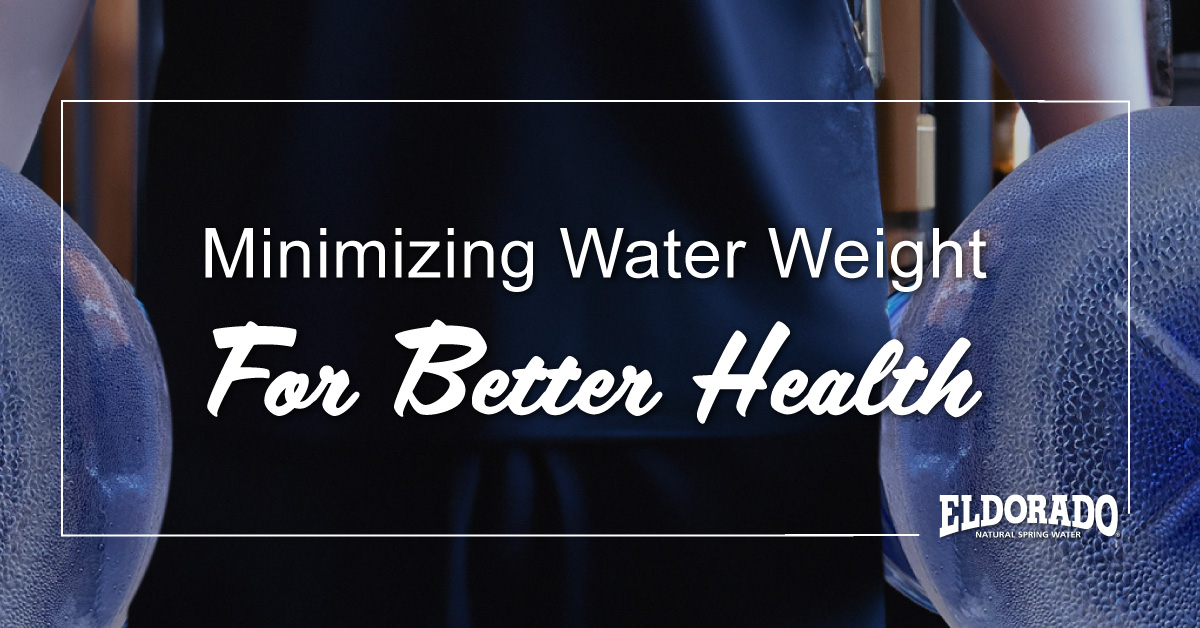Minimizing Water Weight for Better Health

Most people have heard the term “water weight.” However, it may not mean much to you unless
you’re pursuing weight loss or trying to understand the weight fluctuations you experience.
Then, you might become much more interested in what water weight is, why it develops, and
how to reduce or eliminate it.
This article provides details on—and answers questions about—water weight. Before diving in,
we should point out that the key to reducing water weight is not to drink less water. In fact,
staying hydrated is essential to reducing water weight—as counterintuitive as that may sound!
What Is Water Weight?
Water weight (technically “edema”) is when the body contains more water than it needs for
optimal functioning. An adult’s body weight is typically 50 to 60% water. If your percentage is
temporarily higher than that, you are said to be experiencing water retention or water weight.
Where is that water? It typically is in your tissues or between your blood vessels. Outwardly, you
may notice water weight as bloating in your midsection, puffiness in your face or fingers, or
swelling in your legs, ankles, or feet. Often, that observation comes after a period of over-
indulging, like drinking more alcohol than you usually do, eating big meals, etc. Water weight is
common in people on vacation for precisely that reason!
What Causes Water Weight?
Several factors can contribute to water retention, including:
- Consuming too much sodium. This is the most common cause of water weight. Your
body is continually working to maintain a specific salt-to-water ratio. If your sodium
intake exceeds your body’s needs, it may hold onto extra water to rebalance that ratio. - Eating too many carbohydrates. The body stores carbs in the muscles and liver as
glycogen. For every gram of glycogen stored, your body secures 3-4 grams of water. If
you overload on carbs, your body compensates by retaining more water. (This
relationship also explains why reducing your carb intake as part of a diet can produce
what seems like dramatic initial weight loss. You’re consuming fewer calories, and your
body is holding on to less water.) - Lack of physical activity. Movement helps your body manage fluids effectively. That’s
one of the benefits of physical activity that many people aren’t aware of. If you have a
sedentary lifestyle or must take a temporary break from your usual activities, you may
notice water pooling in your ankles and feet. - Hormone imbalance. Changes in hormone levels can affect how your body stores and
releases water. Women often are familiar with weight gain related to menstruation and
pregnancy. In those instances, water weight resolves on its own. However, water
retention that persists (in women or men) may be a sign of a hormone imbalance and
something you should discuss with your doctor. - Specific medications. Some drugs (like those for high blood pressure, depression, and
pain relief) can cause water weight gain. So can certain chemotherapy medications. If
you experience water retention that concerns you, your doctor may be able to modify
your medication regimen to reduce it. - Chronic health conditions. Some heart, kidney, or liver problems can cause increased
water weight. If you experience water retention that isn’t explained in some other way,
you should contact your doctor.
How To Reduce Water Weight
If you experience bothersome water weight, the good news is that there are ways to address it.
Many of them involve adopting and maintaining healthy eating habits.
For example, lowering your sodium intake as part of a balanced diet may be helpful. You might
also try eating more potassium-rich foods like fruits and vegetables, beans, nuts, low-fat dairy,
and leafy greens. Potassium helps your body manage its sodium/water ratio effectively. Many
people also get relief from water weight by reducing their carb intake. At the end of the day,
what your body wants is a good nutrient balance.
And here’s that counterintuitive water-related tip: To reduce water weight, you should drink more
water! Many people also ask, “Does drinking water aid weight loss?” Yes, it can. These two
benefits lead to another question: “How much water should you drink for weight loss or water
weight control?” That depends on many factors, but a good rule of thumb is 64 ounces daily,
and more if you exercise regularly. For water weight management in particular, increasing your
water intake teaches your body that it doesn’t have to “hold on to” so much.
Exercising regularly is also crucial since movement is essential to fluid management and
because sweating eliminates water from the body. What’s the best physical activity for weight
loss or water weight control? That depends on your physical condition, goals, and other factors.
It’s a good idea to talk with your doctor about the right exercise for you.
As noted previously, some medications can cause water retention. However, it goes without
saying that you should not modify your medication regimen without first talking with your doctor
about the change.
Leverage Healthy Lifestyle Habits To Eliminate Water Weight
It’s common to experience occasional bouts of water weight gain. But if you’re regularly
retaining more water than you should or are comfortable with, adopting a more healthy lifestyle
—including drinking plenty of Eldorado Spring Water—typically can address the problem!







